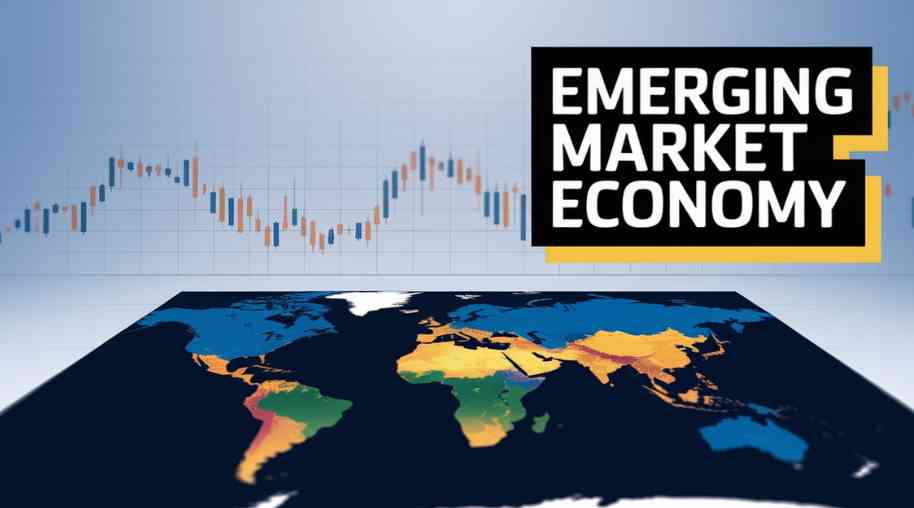EME Full Form-Emerging Market Economy
by Shashi Gaherwar
0 2291
Emerging Market Economy (EME): Characteristics, Growth Drivers, and Investment Potential
Introduction
An emerging market economy (EME) is a developing nation transitioning into an advanced economy through industrialization, foreign investments, and financial market expansion. Countries like China, India, Brazil, and South Africa represent emerging markets that are reshaping the global economy.

This article explores the features, advantages, risks, and investment opportunities in emerging market economies, providing valuable insights for investors and policymakers.
What is an Emerging Market Economy (EME)?
An emerging market economy is characterized by rapid economic growth, increasing foreign trade, and an expanding middle class. While these economies offer high investment returns, they also pose risks such as political instability and currency fluctuations.
Key Characteristics of Emerging Market Economies
- Rapid Economic Growth: EMEs experience higher GDP growth due to industrialization and urbanization.
- Increasing Foreign Direct Investment (FDI): They attract global investments, boosting infrastructure and employment.
- Expanding Middle Class: Growing disposable incomes drive consumer demand.
- Industrialization and Technological Advancement: EMEs shift from agriculture to manufacturing and technology sectors.
- Financial Market Development: Stock markets, banking sectors, and investment avenues expand, integrating with global financial systems.
- Economic and Political Reforms: Many emerging economies implement reforms to enhance business environments and economic stability.
Examples of Emerging Market Economies
- BRICS Nations: Brazil, Russia, India, China, South Africa.
- Southeast Asia: Indonesia, Vietnam, Philippines.
- Latin America: Mexico, Argentina.
- Africa: Nigeria, Egypt.
Advantages of Emerging Market Economies
- High Investment Returns: Emerging markets offer higher potential returns due to rapid economic expansion and corporate profitability.
- Diversification Opportunities: Investors benefit from diversifying their portfolios with exposure to fast-growing economies.
- Growing Consumer Markets: A rising middle class fuels demand for consumer goods, real estate, and financial services.
- Abundant Natural Resources: Many EMEs possess rich natural resources, driving export-led growth in sectors like energy and mining.
Challenges and Risks of Emerging Market Economies
- Market Volatility: Stock markets in emerging economies are highly sensitive to investor sentiment and global economic changes.
- Political and Regulatory Risks: Government instability, policy shifts, and weak regulatory frameworks may impact investments.
- Currency Fluctuations: Exchange rate volatility can affect investment value and inflation rates.
- Infrastructure and Governance Issues: Corruption, poor infrastructure, and inefficient institutions can hinder long-term growth.
Investment Strategies for Emerging Markets
- Mutual Funds and ETFs: Investing in emerging market mutual funds and exchange-traded funds (ETFs) provides diversified exposure with reduced risk.
- Direct Stock Investments: Investors can purchase shares in high-growth companies across technology, finance, and consumer goods sectors.
- Foreign Direct Investment (FDI): Businesses establish operations in emerging markets to benefit from lower costs and expanding consumer bases.
- Government and Corporate Bonds: Emerging market bonds offer higher yields but require careful risk assessment.
Future of Emerging Market Economies
Emerging markets are expected to grow further, driven by:
- Technological Innovation: Adoption of digital infrastructure, fintech, and AI.
- Sustainability Initiatives: Growth in renewable energy and eco-friendly investments.
- Trade Expansion: Increased participation in global trade agreements.
- Urbanization and Infrastructure Development: Continued investment in smart cities and transport systems.
Emerging market economies (EMEs) present immense growth potential and investment opportunities. While they offer high returns, risks such as volatility and political uncertainty require careful consideration. Investors, businesses, and policymakers must understand the evolving landscape of emerging markets to make informed financial decisions.
For those seeking high-growth investment options, emerging markets offer unparalleled opportunities but demand strategic planning and risk management.
Further Learning Resources
If you’re passionate about building a successful blogging website, check out this helpful guide at Coding Tag – How to Start a Successful Blog. It offers practical steps and expert tips to kickstart your blogging journey!
For dedicated UPSC exam preparation, we highly recommend visiting www.iasmania.com. It offers well-structured resources, current affairs, and subject-wise notes tailored specifically for aspirants. Start your journey today!

Share:









Comments
Waiting for your comments